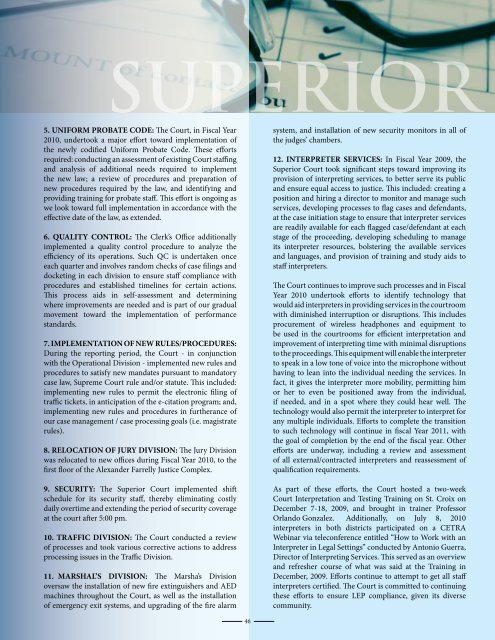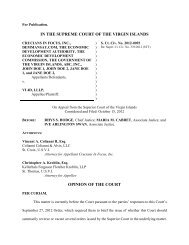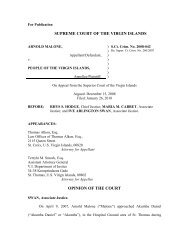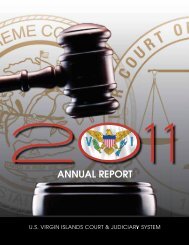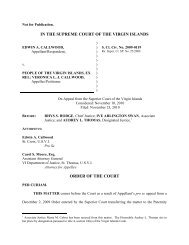2010 Annual Report - Supreme Court of the Virgin Islands
2010 Annual Report - Supreme Court of the Virgin Islands
2010 Annual Report - Supreme Court of the Virgin Islands
Create successful ePaper yourself
Turn your PDF publications into a flip-book with our unique Google optimized e-Paper software.
5. UNIFORM PROBATE CODE: The <strong>Court</strong>, in Fiscal Year<br />
<strong>2010</strong>, undertook a major effort toward implementation <strong>of</strong><br />
<strong>the</strong> newly codified Uniform Probate Code. These efforts<br />
required: conducting an assessment <strong>of</strong> existing <strong>Court</strong> staffing<br />
and analysis <strong>of</strong> additional needs required to implement<br />
<strong>the</strong> new law; a review <strong>of</strong> procedures and preparation <strong>of</strong><br />
new procedures required by <strong>the</strong> law, and identifying and<br />
providing training for probate staff. This effort is ongoing as<br />
we look toward full implementation in accordance with <strong>the</strong><br />
effective date <strong>of</strong> <strong>the</strong> law, as extended.<br />
6. QUALITY CONTROL: The Clerk’s Office additionally<br />
implemented a quality control procedure to analyze <strong>the</strong><br />
efficiency <strong>of</strong> its operations. Such QC is undertaken once<br />
each quarter and involves random checks <strong>of</strong> case filings and<br />
docketing in each division to ensure staff compliance with<br />
procedures and established timelines for certain actions.<br />
This process aids in self-assessment and determining<br />
where improvements are needed and is part <strong>of</strong> our gradual<br />
movement toward <strong>the</strong> implementation <strong>of</strong> performance<br />
standards.<br />
7. IMPLEMENTATION OF NEW RULES/PROCEDURES:<br />
During <strong>the</strong> reporting period, <strong>the</strong> <strong>Court</strong> - in conjunction<br />
with <strong>the</strong> Operational Division - implemented new rules and<br />
procedures to satisfy new mandates pursuant to mandatory<br />
case law, <strong>Supreme</strong> <strong>Court</strong> rule and/or statute. This included:<br />
implementing new rules to permit <strong>the</strong> electronic filing <strong>of</strong><br />
traffic tickets, in anticipation <strong>of</strong> <strong>the</strong> e-citation program; and,<br />
implementing new rules and procedures in fur<strong>the</strong>rance <strong>of</strong><br />
our case management / case processing goals (i.e. magistrate<br />
rules).<br />
8. RELOCATION OF JURY DIVISION: The Jury Division<br />
was relocated to new <strong>of</strong>fices during Fiscal Year <strong>2010</strong>, to <strong>the</strong><br />
first floor <strong>of</strong> <strong>the</strong> Alexander Farrelly Justice Complex.<br />
9. SECURITY: The Superior <strong>Court</strong> implemented shift<br />
schedule for its security staff, <strong>the</strong>reby eliminating costly<br />
daily overtime and extending <strong>the</strong> period <strong>of</strong> security coverage<br />
at <strong>the</strong> court after 5:00 pm.<br />
10. TRAFFIC DIVISION: The <strong>Court</strong> conducted a review<br />
<strong>of</strong> processes and took various corrective actions to address<br />
processing issues in <strong>the</strong> Traffic Division.<br />
11. MARSHAL’S DIVISION: The Marsha’s Division<br />
oversaw <strong>the</strong> installation <strong>of</strong> new fire extinguishers and AED<br />
machines throughout <strong>the</strong> <strong>Court</strong>, as well as <strong>the</strong> installation<br />
<strong>of</strong> emergency exit systems, and upgrading <strong>of</strong> <strong>the</strong> fire alarm<br />
system, and installation <strong>of</strong> new security monitors in all <strong>of</strong><br />
<strong>the</strong> judges’ chambers.<br />
12. INTERPRETER SERVICES: In Fiscal Year 2009, <strong>the</strong><br />
Superior <strong>Court</strong> took significant steps toward improving its<br />
provision <strong>of</strong> interpreting services, to better serve its public<br />
and ensure equal access to justice. This included: creating a<br />
position and hiring a director to monitor and manage such<br />
services, developing processes to flag cases and defendants,<br />
at <strong>the</strong> case initiation stage to ensure that interpreter services<br />
are readily available for each flagged case/defendant at each<br />
stage <strong>of</strong> <strong>the</strong> proceeding, developing scheduling to manage<br />
its interpreter resources, bolstering <strong>the</strong> available services<br />
and languages, and provision <strong>of</strong> training and study aids to<br />
staff interpreters.<br />
The <strong>Court</strong> continues to improve such processes and in Fiscal<br />
Year <strong>2010</strong> undertook efforts to identify technology that<br />
would aid interpreters in providing services in <strong>the</strong> courtroom<br />
with diminished interruption or disruptions. This includes<br />
procurement <strong>of</strong> wireless headphones and equipment to<br />
be used in <strong>the</strong> courtrooms for efficient interpretation and<br />
improvement <strong>of</strong> interpreting time with minimal disruptions<br />
to <strong>the</strong> proceedings. This equipment will enable <strong>the</strong> interpreter<br />
to speak in a low tone <strong>of</strong> voice into <strong>the</strong> microphone without<br />
having to lean into <strong>the</strong> individual needing <strong>the</strong> services. In<br />
fact, it gives <strong>the</strong> interpreter more mobility, permitting him<br />
or her to even be positioned away from <strong>the</strong> individual,<br />
if needed, and in a spot where <strong>the</strong>y could hear well. The<br />
technology would also permit <strong>the</strong> interpreter to interpret for<br />
any multiple individuals. Efforts to complete <strong>the</strong> transition<br />
to such technology will continue in fiscal Year 2011, with<br />
<strong>the</strong> goal <strong>of</strong> completion by <strong>the</strong> end <strong>of</strong> <strong>the</strong> fiscal year. O<strong>the</strong>r<br />
efforts are underway, including a review and assessment<br />
<strong>of</strong> all external/contracted interpreters and reassessment <strong>of</strong><br />
qualification requirements.<br />
As part <strong>of</strong> <strong>the</strong>se efforts, <strong>the</strong> <strong>Court</strong> hosted a two-week<br />
<strong>Court</strong> Interpretation and Testing Training on St. Croix on<br />
December 7-18, 2009, and brought in trainer Pr<strong>of</strong>essor<br />
Orlando Gonzalez. Additionally, on July 8, <strong>2010</strong><br />
interpreters in both districts participated on a CETRA<br />
Webinar via teleconference entitled “How to Work with an<br />
Interpreter in Legal Settings” conducted by Antonio Guerra,<br />
Director <strong>of</strong> Interpreting Services. This served as an overview<br />
and refresher course <strong>of</strong> what was said at <strong>the</strong> Training in<br />
December, 2009. Efforts continue to attempt to get all staff<br />
interpreters certified. The <strong>Court</strong> is committed to continuing<br />
<strong>the</strong>se efforts to ensure LEP compliance, given its diverse<br />
community.<br />
46


